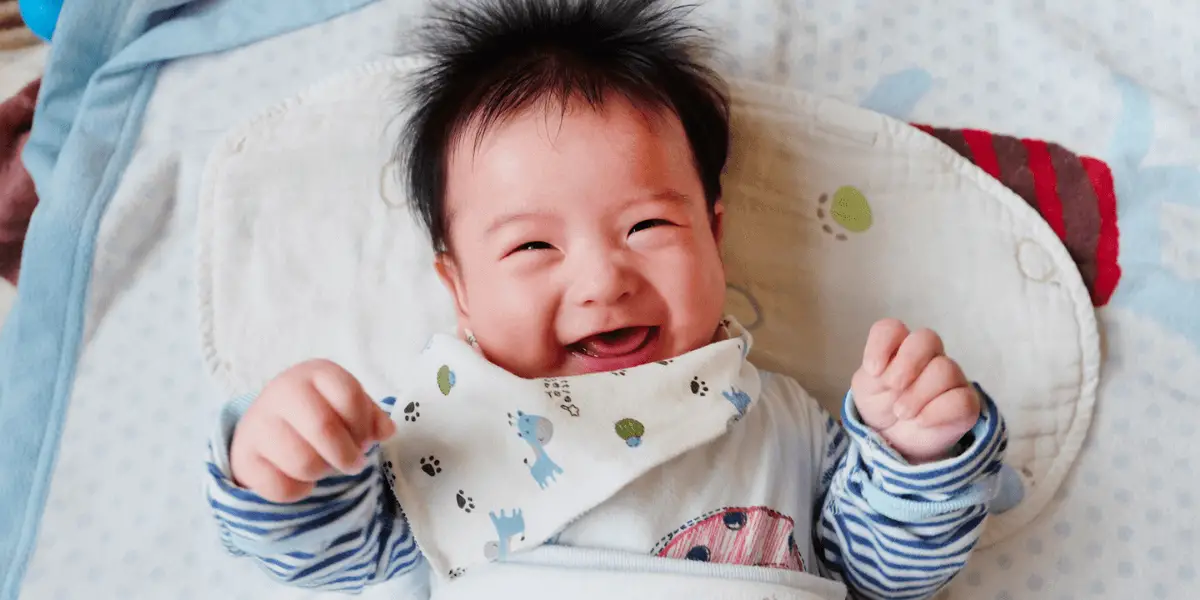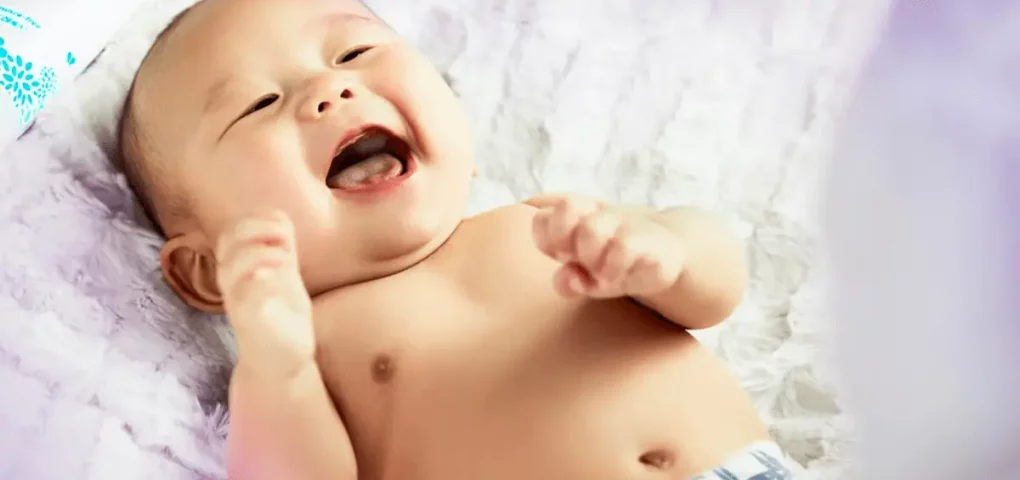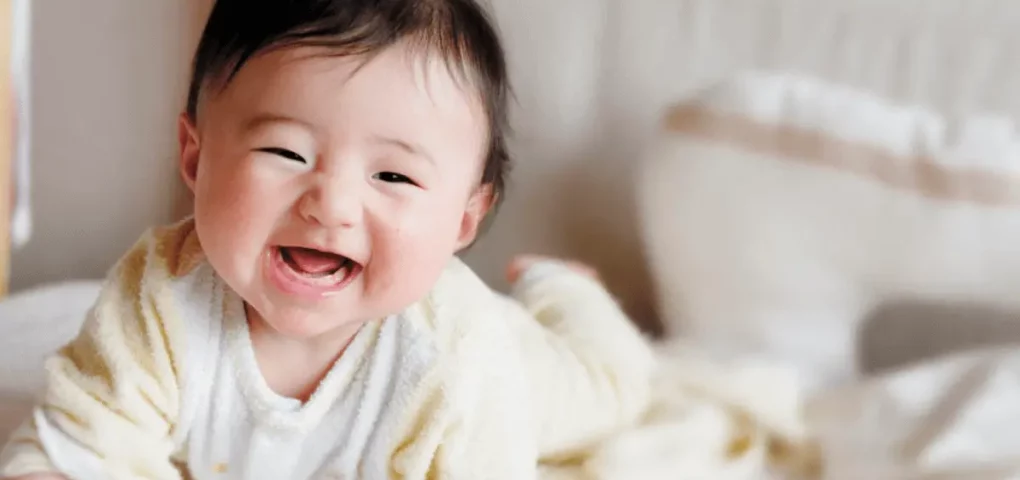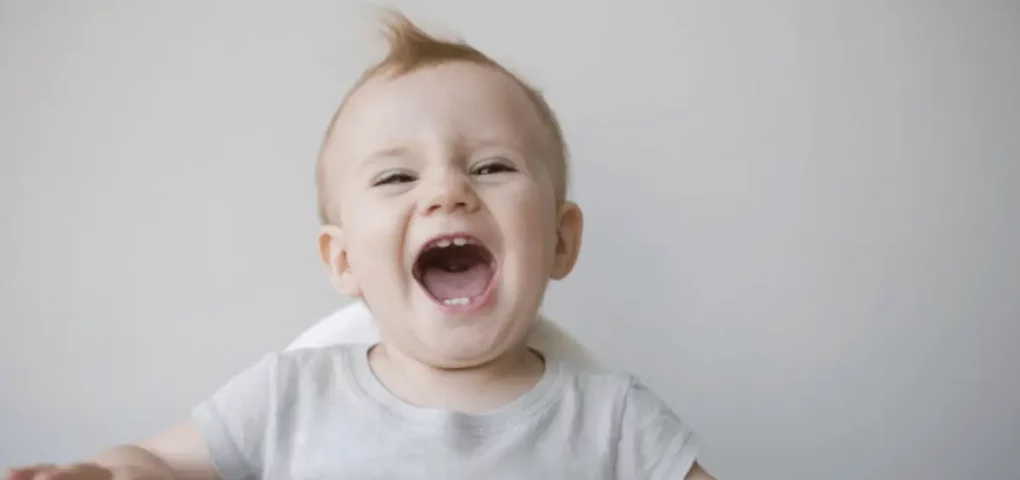
Laughter is contagious, and it is particularly effective with babies. Everyone loves to laugh and see others do so. Even though it seems that some are born to laugh more than others, everybody enjoys a hearty chuckle now and then.
People often begin to laugh before they are out of their mother’s womb. But, when do babies start laughing?
Hearing your baby laugh is one of the most remarkable moments during their first year. Whether it’s a chuckle or a full belly laugh, once you hear that sound for the first time, you’ll be doing all you can to elicit it as often as possible.
The Effects of Laughter in Babies

Laughing is an integral part of development for babies who are only a few days old. They laugh when they are tickled, when something surprises them or when their parents make funny faces. Unfortunately, some parents think the baby has gas pains, whereas nothing is wrong.
People usually laugh in reaction to something humorous or unexpected. Still, babies are born with pre-wired laughter circuitry, which leads to their response through the peak facial expressions of surprise and joy when they are tickled.
Babies can’t communicate in words, so they use different forms of communication depending on what kind of behavior is required. Adults learn to predict the kind of message the child is sending during their interactions at a given time.
For adults who have never been around babies much, it can be difficult to understand when the baby may signal that they are uncomfortable rather than just fussy or need a fresh diaper.
The Contagiousness of Laughter in Babies

There is no doubt that babies love to laugh, and they want to encourage this type of behavior in others, but unfortunately, it can be hard to understand for some people.
For example, when the baby starts laughing, one parent may think it’s cute, but the other may think that something is wrong with the baby. When a stranger hears a baby laugh at their face, they feel confused and uncomfortable because they lack understanding of what is going on in this situation.
To ensure that the baby’s laughter is taken as a positive sign, parents should react in the same way they would if the baby were laughing when they were doing something else. This means that it is important not to look visibly confused or change their behavior to match what could have made the baby laugh.
If in doubt, just continue with their routine and focus on playing with the baby in a fun way for both of them. Babies can communicate their feelings with adults who know how to understand them, and this is not limited only to parents or close relatives.
It also includes babysitters, grandparents, siblings, and all other people the baby interacts with regularly.
Being around babies can make anyone laugh, but it is important to keep in mind that babies are simply born with an inclination for laughing, and they do so more than people think.
Whether or not adults understand this, they should consider the baby’s laughter a good sign since it means that the baby is enjoying their time together and wants the adult to stay longer and play some more.
So, When Do Babies Start Laughing?

Some babies start laughing as soon as they enter the world and find themselves in a new environment completely different from what they were used to inside their mother’s womb. Babies also laugh when they are relaxed or during bodily functions like burping, passing gas, etc.
Babies can also laugh with other people, which is opposite to how most adults react.
Now that you know that babies often laugh, here is some more information on why they laugh like it’s nobody’s business:
Parents with more than one child find out that different babies may laugh for different reasons. The baby’s laughter reflects the joy and happiness they feel during their interactions with other people, and there is no limit as to whom they can play and enjoy themselves.
What Makes Babies Laugh?

Most experts agree that the root of humor is taking something in its familiar form and turning it upside down or making it offbeat. That’s why very young babies really don’t have a sense of humor —they’re still learning how the world looks, feels, and sounds in an ordinary context, so they don’t understand when something is totally out of the ordinary.
It takes years of experience to build up enough context for humor—that’s how it becomes an acquired taste, like enjoying people-watching or good books.
Sound effects like cooing will begin once your baby masters smiling and can recognize the positive reactions. Cooing will turn into giggles, and soon after, you will likely hear your baby’s first laugh.
It has been discovered that it doesn’t matter what age the person is–as long as they laugh with the baby, this interaction will make them laugh. However, it is interesting that babies may choose to play and laugh only with older people like their parents or other family members because of their age and maturity level.
Moreover, babies love to imitate behavior, and if they see an adult do something funny, chances are they will start laughing as well because they want the adult to do it again.
Research has shown that babies may laugh simply by looking at a person’s face, which makes them different from other animals. For example, if an adult or a child watches a silly movie together with the baby, chances are the baby will keep smiling throughout the movie and will not laugh out loud.
Note: a parent can tell if their baby has been laughing even though they were silent by looking at the baby’s face carefully. The chances are that there is a small crack on one of their cheeks or around their eyes because it is almost impossible for them to hold back a grin.
Babies Start Laughing at Around 12 Weeks Old

Most babies will begin laughing when they’re only three or four months old. At around eight weeks, babies laugh during playtime with their parents or other responsible adults taking care of them, just like they would with their brothers, sisters, or friends of the same age.
Although there is a range in terms of when babies reach their milestones, remember to keep an eye out for signs of a developmental delay so they can receive early intervention services if needed.
At about four months, a baby begins to laugh at things they can see and hear. But babies have different kinds of laughs. One of these types is the giggling laugh which usually makes them look very happy and content, especially when they are being tickled or played in a particular way that they enjoy.
If your baby isn’t laughing by six months of age, it’s a good idea to bring this up with a doctor.
Babies are able to communicate, but they can also feel empathy towards others which is why even if they don’t know someone who is crying, they may start laughing instead of crying themselves because laughter is a powerful way to show joy and happiness.
Sometimes, the reason why babies laugh is that they are trying to communicate their feelings and emotions.
For example, some babies laugh when they need something from their parents, such as feeding time, changing clothes, or a ride in the car. A baby does not yet understand speaking at this age, so all his attempts to communicate are carried out through laughing.
Parents can choose between two avenues to make their babies laugh. The first requires letting go of inhibition and just being silly. Playful voice changes, funny noises, using facial expressions one might expect from a mime or clown.
Don’t worry. Babies don’t have the manual dexterity to hit the record button on a cell phone, and all of this will fade from their memory before they can talk.
Conclusion
Babies laugh for many different reasons, and it is important to look at the baby’s face before deciding if they are laughing because they are happy or sad.
If you’re asking when do babies start laughing, well, babies start laughing even though they don’t find something funny because laughter is a powerful way to show joy and happiness.
Even though the baby’s laughter may make them look silly, it is good to keep in mind that laughing is one of the best things a person can do during their lifetime.


Leave a Reply